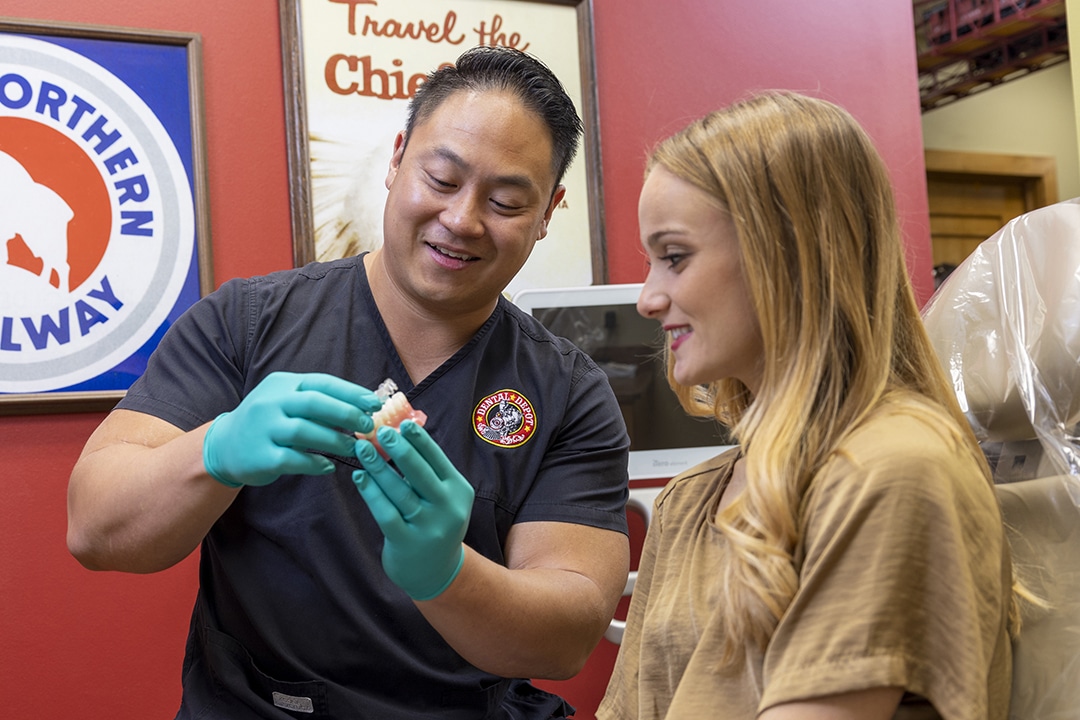Schedule Orthodontic Consultation
Braces, Invisalign, Retainers
Braces, Invisalign, Retainers
Restorations like dental bridges and crowns help ensure your smile stays healthy, strong, and functional. By helping to correct misshapen, damaged, or decayed teeth or replacing missing teeth, dental crowns, and bridges preserve the shape and alignment of your jaw and prevent future problems like infection or bone deterioration.

At Dental Depot of Oklahoma, our goal is always to help our patients achieve their best oral health, and we understand that sometimes that requires restorative work. If you have a severely damaged or decayed tooth or need to have a tooth extracted, we can customize a crown or bridge that looks, feels, and functions just like natural teeth so you can smile confidently. Our staff of dental professionals includes prosthodontists and general dentists experienced in dental prostheses. We only use the most current state-of-the-art technology, techniques, and diagnostics to deliver your desired care and results.
Dental restorations are necessary for protecting oral health and re-establishing proper oral function. If teeth are affected by a dental injury or tooth decay, they can often be treated with a simple restoration to prevent further deterioration of tooth structure. Since a tooth cannot regenerate tissue to heal like other mineralized structures, restorations are necessary when it develops dental caries or has been cracked or chipped. For instance, a broken bone can heal over time, but a tooth cannot.
Once a tooth is damaged and remains unprotected, its condition worsens. As more of the tooth deteriorates, its innermost and more sensitive structures, such as the root, will become exposed to oral debris and bacteria.
When the root is exposed to bacteria, root canal therapy can become necessary to stop the advancement of the infection and, ultimately, the development of a painful infection that starts at the root of a tooth (an abscess). If a tooth is beyond repair with restorations or endodontics (root canal treatment), it must be extracted, and tooth replacement options will become necessary.
If a damaged or diseased tooth is treated in time, a dental crown or bridge can easily prevent the development of an infected root canal or an abscess. If it has to be extracted, the crown or bridge can replace the entire tooth.
A crown is essentially a tooth-shaped cap permanently placed on an implant or remaining natural tooth structure to protect what is left of a tooth or replace a missing tooth, preventing further damage and preserving the shape, function, and integrity of the smile.
Dental crowns are more extensive restorations than simple fillings. Unlike a filling, which “fills in” a tiny cavity cleaned of decay, a dental crown covers an entire tooth above the gum line. In instances of a missing tooth, the dental crown is connected to an abutment attached to a dental implant, a tiny titanium screw inserted in the jaw bone to mimic a natural tooth root.
Not only do crowns have restorative applications, they can also be used to enhance the aesthetics of a smile. For instance, patients with misshapen or badly damaged teeth can receive multiple crowns to create a more visually pleasing smile.
Crowns can be used for:
A dental bridge is made up of multiple crowns, and instead of covering a tooth, the dental bridge replaces one or more missing teeth. A dental bridge can replace up to three or four teeth if consecutive teeth are missing. The crowns cemented together in a dental bridge will be connected to natural teeth on each side and will fill in the missing gaps of a smile so that you can eat comfortably and smile confidently.
While bridges can be implant-supported—connected to tiny titanium screws implanted in the jaw—other bridges can be a good alternative to implants or dentures if the existing jaw and/or gums can’t support implants if dentures are too uncomfortable or unstable. Other options for bridges include:
Maryland bridges require two natural teeth adjacent to either side of the gap. The crowns are cemented to the back of these natural teeth using either metal or porcelain frames.
Cantilever bridges, which only require one natural tooth on one side of the gap to secure a crown, and the bridge
At Dental Depot, we’re committed to helping all Oklahomans receive the comprehensive, quality dental care they need at a commonsense price. Millions of adults in Oklahoma experience tooth decay, damage, or the loss of one or more teeth every year, so dental restorations like crowns and bridges become critically important to helping preserve their oral and overall health. With multiple locations throughout Norman, Tulsa, and Oklahoma City, convenient Saturday or evening appointments at many offices, and accepted payment options that include SoonerCare, CareCredit, and most major dental insurance plans, Dental Depot strives to make getting professional dental services you deserve easy and affordable.
Don’t spend another day hiding your smile or living in pain from a broken, damaged, or decayed tooth. Call your nearest Dental Depot location today and schedule an appointment to discuss restorative dental options like crowns or bridges.
A crown is used to cap a decayed, damaged, or misshapen tooth at the gum line or to cover a dental implant. A bridge is a set of crowns held together.
Crowns are ideal for teeth that:
Crowns can also be used to anchor dental bridges.
A bridge connects multiple crowns to fill gaps where multiple teeth are missing. Bridges can be attached to adjacent natural teeth or implant-supported. Once placed, a bridge looks, feels, and functions like natural teeth.Bridges are ideal for people who:
The dentists and specialists at Dental Depot can help you determine if a crown or bridge is right for you.
Dental bridges and crowns are not permanent restoration solutions and will need to be replaced eventually. They may also need to be replaced if they become loose or damaged. However, most crowns and bridges are designed to last anywhere from 5 to 15 years or longer, and with proper dental hygiene, including daily brushing and flossing and bi-annual dental check-ups, you can help to extend the longevity of your bridges and crowns.
Signs that your crown or bridge needs to be replaced include:
Bone loss and deterioration in the jaw, or atrophy, occurs where there is nothing to stimulate the jaw, such as a tooth root. Since traditional dental bridges sit above the gum line, they cannot correct bone loss in the jaw. They can, however, keep your natural remaining teeth from shifting, preserving the alignment and structure of your jaw and facial bones so you can still chew, eat, and smile normally.
Implant supported bridges, which attach to small titanium screws placed in the jaw, can help correct bone loss in the jaw, because dental implants act like tooth roots, fusing to the jaw bone.
Crowns and bridges might fall out or break for a variety of reasons. If this happens, it is important that you call your dentist as soon as possible to schedule an appointment; a broken or missing crown or bridge can leave your mouth and teeth susceptible to infection, decay, and shifting. If possible, bring the crown or bridge to the appointment so the dentist can determine if it is still usable. If it is, the dentist may be able to simply reattach it as opposed to creating you an entirely new one. If it isn’t, you may need to have a new crown or bridge made.
A crown refers to a tooth-colored cap that corrects an uneven or chipped tooth. This can be cosmetic or restorative and is fitted to a tooth with an existing root structure.
A dental implant crown is restorative and serves as a replacement for an entire tooth. Dental implant crowns are artificial teeth that are attached to an abutment, which protrudes out of the gum. The abutment itself is attached to a dental implant, which is a small titanium screw implanted into the jaw bone and which acts as a tooth root.
Patients also have options for what materials are used to fabricate their crowns or bridges. Common materials include ceramic, porcelain fused to metal, porcelain, composite resin, and metal alloys. Metals are ideal for budget-conscious patients or replacing teeth at the back of the mouth, while porcelain is ideal for those who want a natural dental restoration. Porcelain fused to metal is also popular, where porcelain serves as a natural-looking complement to your smile without sacrificing the durability of metal.
